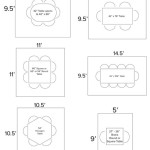Essential Aspects of Patio Slab Laying Patterns 4 Sizes
Creating a beautiful and functional patio requires careful consideration of the materials and patterns used. Patio slabs, available in a variety of sizes, offer a versatile way to achieve the desired look and functionality. In this article, we will explore the essential aspects of patio slab laying patterns 4 sizes.
Choosing the Right Pattern
The first step is to select a laying pattern that complements the size and shape of your patio area. The most popular 4-size patterns include:
- Square pattern: A classic and timeless choice, creating a symmetrical and orderly appearance.
- Rectangular pattern: Provides a more contemporary look, with slabs laid in a linear arrangement.
- Herringbone pattern: A visually striking pattern with slabs laid in a zigzag formation.
- Random pattern: Offers a more organic and casual aesthetic, with slabs placed in a random order.
Materials and Preparation
Once you have selected a pattern, it's essential to choose high-quality patio slabs made from durable materials such as concrete, natural stone, or porcelain. Prepare the site by excavating the area, leveling it, and installing a gravel or sand base.
Laying the Slabs
To ensure a stable and level patio, follow these steps when laying the slabs:
- Start from the center: Begin laying the slabs from the center outwards to establish a straight line.
- Use spacers: Place spacers between the slabs to maintain even spacing and prevent movement.
- Tamp down the slabs: Use a rubber mallet or plate compactor to tamp down the slabs and create a solid foundation.
Jointing and Finishing
Once the slabs are laid, fill the joints with a suitable material such as jointing sand or polymeric sand. This helps to prevent weeds and insects from growing in the gaps and provides a clean and finished look. Finally, seal the slabs to protect them from staining and weathering.
Additional Considerations
In addition to the above aspects, consider the following factors when planning your patio slab laying pattern:
- Patio size: Larger patios require larger slabs to maintain a cohesive look.
- Slab thickness: The thickness of the slabs should be appropriate for the intended use and traffic level.
- Drainage: Ensure that the patio has adequate drainage to prevent water accumulation.
Conclusion
By carefully selecting a patio slab laying pattern 4 sizes, preparing the site properly, and following the laying and finishing techniques outlined above, you can create a beautiful and durable patio that complements your outdoor living space.

Kandla Grey N Sandstone Paving Slabs Patio Packs 22mm Stone Direct

Installation Guide Patterns Paving Stones Direct

Patio Paving Ideas For Autodalle

Patterns And Layouts For Flags Slabs Pseudo Random Pavingexpert

Laying Patterns Bricks Timber Pavers And Building Supplies

Paving Laying Guide Ammaari Stones

Paving Patterns Patio Layouts Guide Lsd

Paving Patterns Patio Layouts Guide Lsd

Patterns And Layouts For Flags Slabs Pseudo Random Pavingexpert

Laying Patterns Kebur Garden Materials








